
| Come and Hear™ to increase interfaith understanding http://www.come-and-hear.com This page has been cached from its original location to ensure availability for future students of Come and Hear™ |

| Myriad
emotions flowed through Rabbi Yosef Yitzchok Sirota and Devorah Leah
Gurary on "the holiest day of their lives" - their wedding day.
Devorah Leah Gurary was nervous and excited when a stoic but overjoyed Yosef placed an opaque veil over her head, a ritual done right before the wedding. Though it took only two months to plan, a wedding in the Orthodox Chassidic Jewish tradition has deep, lifelong spiritual meaning and symbolism. The wedding day is considered the couple's private Yom Kippur - the Day of Atonement - and the reunion of a once-divided soul in a man and a woman. The marriage ceremony under the canopy, or Chuppah, is symbolic of the Jewish people's meeting with God at Mount Sinai and the relationship that was forged. The groom is circled seven times by the bride and her parents holding candles to represent infinity - the length of the marriage. The candles are symbolic of the fire that God used at Mount Sinai. A glass is broken at the end of the ceremony as a reminder of the spiritual exile from the Holy Temple of Jerusalem. "Everything that we do is symbolic of the marriage between God and the Jewish people," said Rabbi Noson Gurary, father of the bride and executive director of the Chabad House of Western New York, a branch of the Lubavitcher Chassidic movement. "At Mount Sinai, God was the groom and the Jewish people were the bride." With such heavy emphasis on spirituality, the couple fast and repent the day of the wedding to have all past sins forgiven and start their new life together with a clean slate. "It's exciting and scary at the same time," said the 21-year-old bride. The groom, who turned 24 the day before the wedding, described the event as "a great moment in your life when you find the one that makes you whole." The big day was Tuesday in the University at Buffalo's Center for the Arts on the North Campus. About 350 people - from as far away as Israel - attended the wedding. Many of the guests are from Brooklyn's Chassidic community in Crown Heights. The young couple, who met through family members five months ago, had gone seven days without talking to or seeing each other. And on the day of their wedding, they were still apart as the guests started pouring in. The reception, or the Kabbolos Ponim, takes place before the ceremony and is held in separate rooms for the bride and groom, or the Kallah and the Chosson in Hebrew, and is attended only by members of the same sex. The bride, dressed in an off-white silk dress, sat on a stage flanked by her mother, the groom's mother, and her paternal and maternal grandmothers. Between hugs and kisses from the guests, Devorah Leah Gurary quietly read to herself the 150-chapter Psalms of David, a required reading for brides before their weddings. The other women, dressed to the nines in long dresses and gowns, socialized as they munched on cakes and enjoyed live music, performed by world famous Yossi Piamenta. Meanwhile, the groom sat at the head of the table in a downstairs room with the male guests. Surrounded by his father, a grandfather and the bride's father and grandfathers, who are all rabbis, the groom prepared to recite the Hasidic marriage discourse or Lecha-Dodi, which speaks to the importance of the union and Jewish mysticism. Both mothers then joined the men to break a plate to seal the couple's engagement. The shattered plate, which cannot be whole again, represents the irreversible engagement. Arm in arm with his father and the bride's father, the bridegroom and his male entourage walked upstairs for the veiling of the bride, or Bedeken. In the Bible, Jacob was tricked into marrying Leah instead of her sister Rachel because he didn't do the veiling of the bride. The 60-year-old veil that the bride wore was stained with tears from previous use. It is a veil passed down from the Previous Chabad Rebbe, who wept on it as he prayed for redemption. Women wept as the veil was placed over the bride's head, and the groom's grandfather and her grandfathers delivered blessings by praying over her. The marriage ceremony, which has two parts, the Kiddushin and Nisuin, always takes place - rain or shine - outside under the canopy, because God told Abraham that his children will multiply just like the number of stars in the sky. The ceremony was performed by Rabbi Zalman Gurary, the bride's grandfather. The Kiddushin is the betrothal ceremony, in which the groom places a ring on the bride's right forefinger. "The blessings that they receive under the canopy have an effect on their children and their children's children," Gurary said. Between the Kiddushin and the Nisuin, the marriage contract or Kesubah, which details the husband's obligation to his wife, from paying the bills to providing clothing, is read. During Nisuin, the marriage seven blessings are recited by seven different people over wine. The couple then drinks the wine and the groom breaks the glass with his right foot, as a reminder of the destruction of the Holy Temple of Jerusalem. "Even at the most happy and joyous occasions, we must not forget about our spiritual exile," Gurary said. Fast and rhythmic clapping and circle dancing followed the crushing of the glass, which marked the end of the wedding and the start of the celebration, which included a meal, more circle dancing into the night and the hoisting of the newlyweds onto a table for a dance. Also, the couple went to a private room where they broke their fast and spent time alone for the first time as husband and wife. During seven days after the wedding, the couple is treated like royalty and parties and celebrations are held every day for them. The day after the wedding, the newlyweds were still searching for the words to explain the experience. "We were both overwhelmed with gratitude to God that he arranged that we find each other," the bride said. "I feel like the luckiest girl in the universe. I'm lucky that I got him." "We wish that everyone would have an opportunity to experience it," added the groom. The newlyweds moved to Crown Heights on Thursday, where Yosef plans to further his rabbinical studies and Devorah will teach preschool. |
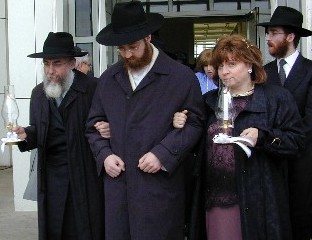 Rabbi
Shlomo Zalman and Rebbetzin Feiga Sirota are accompanying the groom Yosef
Yitzchak to the Chupah. His older brother Avrohom is standing
behind
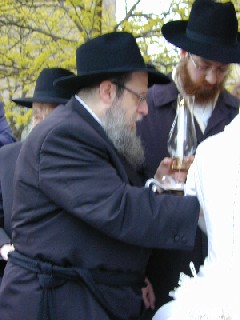 Rabbi
Noson Gurary, father of the bride, leads his daughter in circling around
the groom
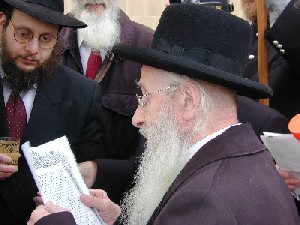 The
grandfather of the bride, Rabbi Hendel of Montreal, is reading the Ksubah
(marriage contract), and Rabbi Shmaryohu Charitonow is
watching.
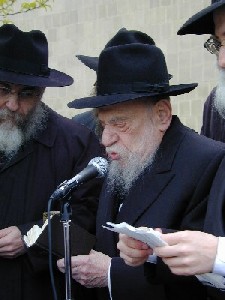 Rabbi
Shneur Zalman Gurary, grandfather of the bride
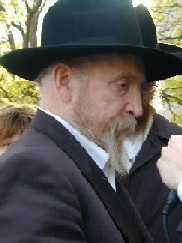 Rabbi
Sirota, grandfather of the groom
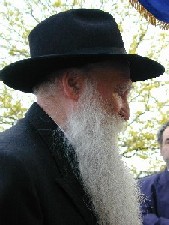 Rabbi
Zalman Serebryansky, relative of the groom
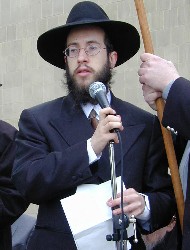 Rabbi
Moshe Gurary, brother of the bride, is leading the ceremony
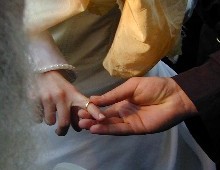 "With
this ring you are consecrated to me according to the law of Moses and
Israel"
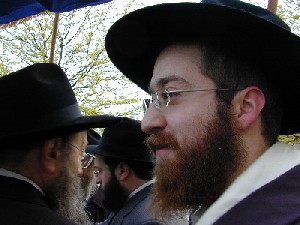 The
groom after the wedding ceremony
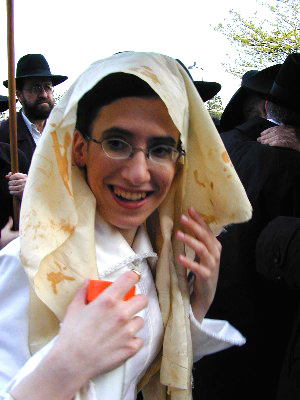 The
bride after the wedding
ceremony |